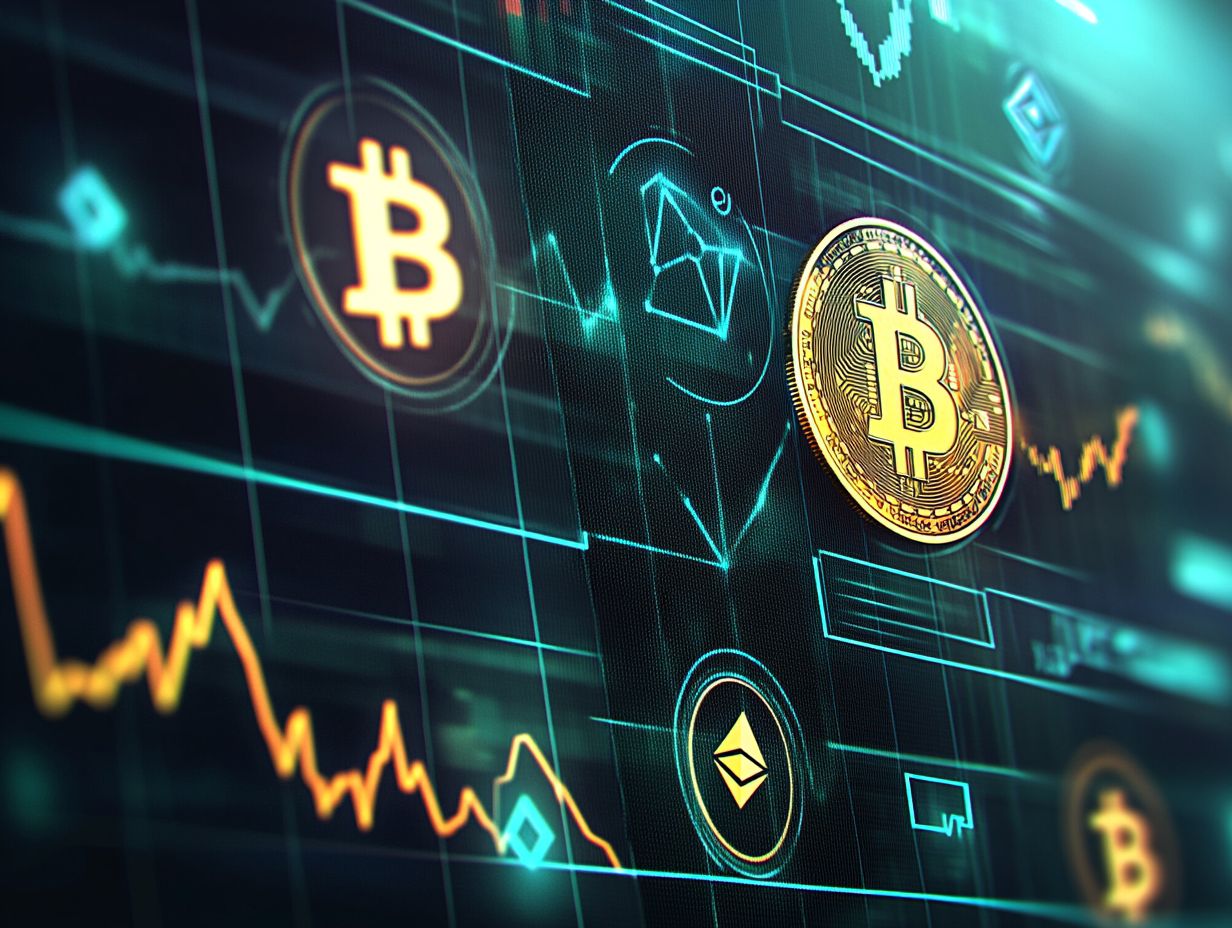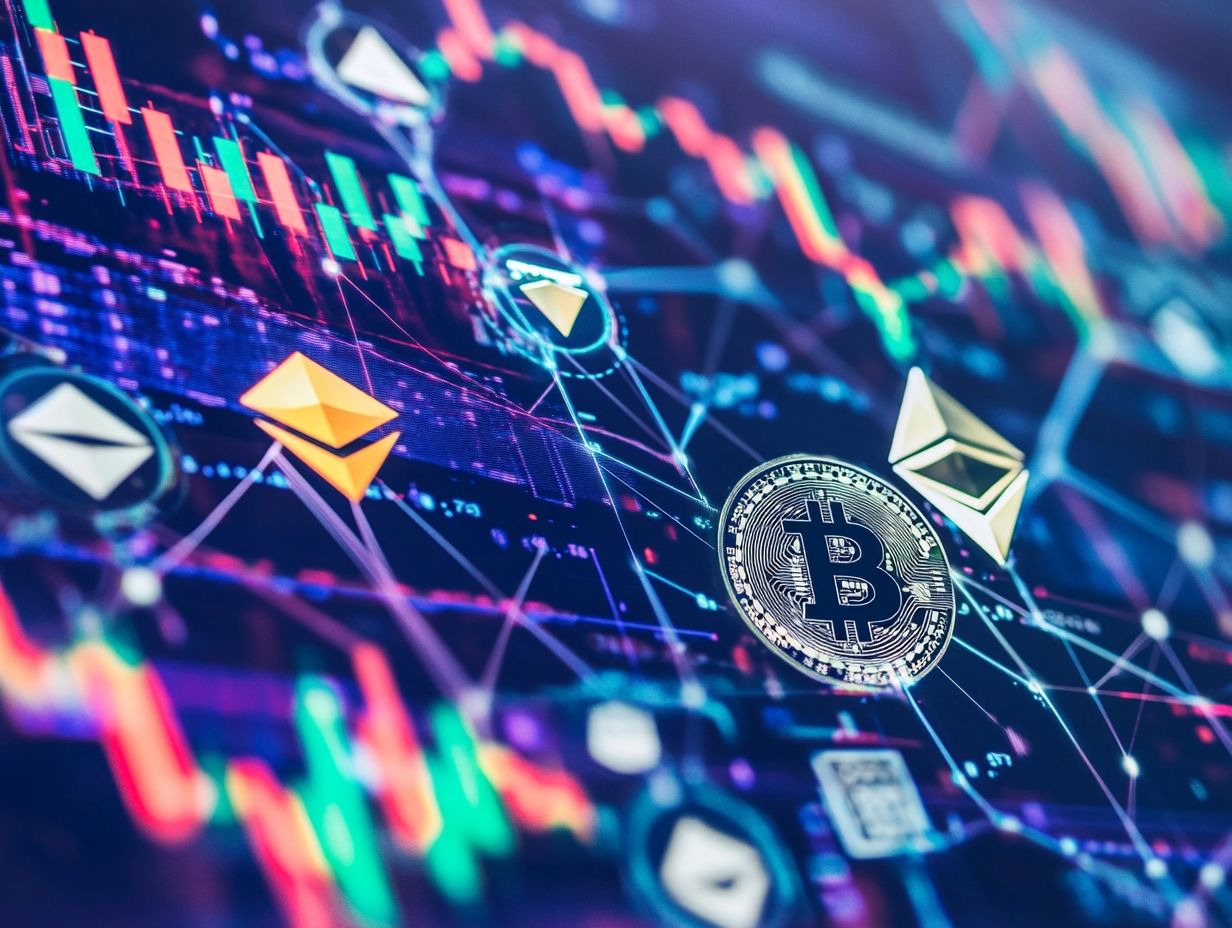The Role of Decentralized Finance in Cryptocurrency
Decentralized Finance (DeFi) is revolutionizing the financial landscape, presenting innovative solutions that challenge the norms of traditional banking systems.
With its promise of increased accessibility, reduced fees, and heightened security, DeFi is capturing the interest of both savvy investors and everyday users alike.
This exploration also shows how DeFi might change the future of finance, contemplating how it might reshape economic interactions.
Join us as we explore this exciting financial revolution!
Contents
- Key Takeaways:
- Benefits of Decentralized Finance
- How DeFi Works
- The Relationship Between DeFi and Cryptocurrency
- Challenges and Concerns with Decentralized Finance
- The Future of Decentralized Finance
- Frequently Asked Questions
- What is the role of decentralized finance in cryptocurrency?
- How does decentralized finance impact the cryptocurrency market?
- What are some examples of decentralized finance in cryptocurrency?
- What are the benefits of using decentralized finance in cryptocurrency?
- What are the risks associated with decentralized finance in cryptocurrency?
- Is decentralized finance the future of cryptocurrency?
Key Takeaways:

- DeFi increases accessibility and security.
- Reduces fees by eliminating intermediaries.
- Aims to disrupt traditional finance.
DeFi makes cryptocurrency more financially feasible and attractive for users and investors. The rise of DeFi is revolutionizing the crypto landscape and has the potential to significantly impact traditional finance in the future.
Defining DeFi and its Purpose
Decentralized Finance (DeFi) represents a major change in the financial landscape, leveraging blockchain technology to eliminate traditional financial intermediaries.
This enables you to engage in peer-to-peer transactions and creates a more efficient ecosystem for managing your digital assets.
At its heart, DeFi seeks to democratize access to financial services, enabling you with economic opportunities that were once reserved for large institutions.
What sets DeFi apart is its commitment to transparency, security, and inclusivity principles that contrast sharply with conventional banking systems, which often depend on centralized authorities.
By employing smart contracts (automated agreements that execute themselves), DeFi significantly reduces the risk of fraud and bolsters trust among users.
This paradigm shift opens the door to an array of financial services, from lending and borrowing to yield farming, all executed on permissionless networks.
As a result, the decentralized nature of this ecosystem fosters innovation and has the potential to lower costs for you, as it circumvents many fees associated with traditional financial intermediaries.
Benefits of Decentralized Finance
Decentralized Finance (DeFi) presents a wealth of advantages, including lower transaction costs and improved consumer protections.
This innovation is poised to make financial services more accessible and efficient for a wider audience, allowing you to navigate the financial landscape with greater ease and confidence.
Increased Accessibility and Security
One of the standout benefits of decentralized finance is its remarkable accessibility and security, enabling you to engage in financial activities without the constraints of traditional systems.
This movement toward a more inclusive financial landscape allows individuals from diverse backgrounds to participate in lending, trading, and investing on permissionless platforms.
These networks are powered by blockchain technology, which securely verifies transactions and ensures you maintain control of your assets without the need for intermediaries.
Consequently, this distribution of financial activities across a wide array of participants significantly reduces systemic risk.
By moving away from reliance on centralized institutions, the chances of large-scale failures are diminished.
Moreover, the transparent nature of DeFi protocols fosters trust, providing you with real-time insights into your investments and operations.
Reduced Intermediaries and Fees
Decentralized finance transforms the financial landscape by significantly reducing the need for intermediaries. This results in lower fees and a more efficient allocation of resources within the crypto markets.
By removing traditional middlemen like banks and brokers, you can engage directly with financial instruments through smart contracts. These contracts automate processes and minimize the chance of human error.
This simpler method not only drastically cuts transaction costs, but also gives you greater transparency and control over your assets. With reduced fees, you re more likely to participate in frequent trading and investing. Ultimately, this boosts liquidity in DeFi platforms.
Economically, this shift fosters a more equitable environment where the incentives to innovate are amplified. It creates a dynamic ecosystem where emerging projects can thrive, free from the burdens of legacy financial systems.
How DeFi Works

Decentralized finance transforms the way you engage with digital assets by operating through a sophisticated network of smart contracts. These contracts automate financial transactions and pave the way for the creation of lending markets and liquidity pools.
This method makes managing your finances easier than ever, offering an unprecedented level of efficiency and autonomy.
Key Components and Processes
The key components of decentralized finance are essential for your understanding. This includes smart contracts that enable automated transactions and yield farming, where you can earn returns on your digital assets.
Smart contracts act as self-executing agreements, with the terms embedded directly in code. This ensures transparency and removes the need for intermediaries. By automating various processes, they save you valuable time and reduce the costs typically associated with traditional finance.
On the other hand, yield farming allows you to lend your cryptocurrencies or provide liquidity in exchange for interest or rewards, often paid in additional tokens. In simple terms, liquidity refers to how easily you can convert assets into cash. This approach not only incentivizes asset holders like yourself but also significantly enhances liquidity across decentralized exchanges.
Together, these elements are reshaping the financial landscape, making it more accessible and efficient for users like you around the globe.
The Relationship Between DeFi and Cryptocurrency
Decentralized finance flourishes on the robust foundation of cryptocurrency. Platforms like Bitcoin and Ethereum, as well as protocols such as Aave and Uniswap, are paving the way for groundbreaking financial solutions and services.
How DeFi is Changing the Crypto Landscape
Decentralized finance is swiftly reshaping the crypto landscape, offering you alternative financial services that tackle issues of economic underdevelopment. This transformation opens up exciting new ways to explore lending, borrowing, and trading options without relying on traditional intermediaries. This means lower costs and enhanced efficiency.
Thanks to smart contracts and blockchain technology, innovations like liquidity pools and yield farming are coming into the spotlight. They invite your active participation and engagement. If you ve found yourself on the outskirts of conventional banking systems, this new world presents low barriers to entry. This fosters greater financial inclusion for you.
As the DeFi sector continues to evolve, it’s clear that it not only democratizes access but also introduces an unprecedented level of transparency and security in financial transactions. This shift greatly impacts crypto markets, and you stand to benefit significantly.
Challenges and Concerns with Decentralized Finance
Despite its numerous advantages, decentralized finance presents several challenges and concerns that warrant your attention.
Regulatory issues loom large, alongside the potential for financial malfeasance that could threaten its integrity. It’s essential to navigate these complexities thoughtfully as you explore the world of decentralized finance. Stay informed and navigate these challenges wisely to make the most of your investment opportunities!
Regulatory Issues and Potential Risks

The regulatory landscape surrounding decentralized finance is ambiguous, presenting potential risks such as challenges in tax enforcement and opportunities for financial misconduct.
This uncertainty serves as a breeding ground for misconduct, where individuals might exploit loopholes or the absence of oversight to evade tax obligations.
As decentralized finance continues to attract a diverse array of users, the implications for tax enforcement become increasingly complex. Regulators face the daunting task of crafting frameworks that effectively address the unique characteristics of DeFi platforms while ensuring security and compliance.
Robust regulatory measures are essential to reduce the risk of illicit financial activities, raising serious questions about the long-term sustainability and integrity of the DeFi ecosystem.
The Future of Decentralized Finance
The future of decentralized finance is exciting, offering you a chance to see traditional finance transformed.
This evolution is poised to drive innovation, fueled by economic incentives and enhanced consumer protections that cater to your needs.
Predictions and Potential Impact on Traditional Finance
Experts foresee that decentralized finance will profoundly influence traditional finance by harnessing blockchain technology to usher in greater transparency and efficiency within financial services.
This shift could transform how you and businesses access lending, investing, and payment services. As these innovations gain traction, traditional institutions may feel the heat to evolve, creating a more competitive landscape.
The emergence of peer-to-peer transactions and smart contracts, or programs that automatically execute agreements when conditions are met, might reduce your reliance on intermediaries, redefining the roles of banks and financial advisors.
This transformation holds the promise of cost savings and enables a wider demographic to access crucial financial tools, promoting greater financial inclusion in regions that have long been underserved by conventional banking systems.
Frequently Asked Questions
What is the role of decentralized finance in cryptocurrency?
The role of decentralized finance (DeFi) in cryptocurrency is to create a decentralized financial system that allows financial activities to be carried out without the need for intermediaries or central authorities. This system is built on blockchain technology, allowing for greater transparency, security, and accessibility for users.
How does decentralized finance impact the cryptocurrency market?

Decentralized finance significantly impacts the cryptocurrency market by allowing a more diverse range of financial products and services to be offered. This leads to increased adoption of cryptocurrencies and a more decentralized and resilient financial ecosystem.
What are some examples of decentralized finance in cryptocurrency?
Examples of decentralized finance in cryptocurrency include decentralized exchanges (DEXs), decentralized lending and borrowing platforms, decentralized stablecoins, and decentralized insurance protocols. These platforms enable trustless and peer-to-peer transactions, removing the need for intermediaries.
What are the benefits of using decentralized finance in cryptocurrency?
The benefits of using decentralized finance in cryptocurrency include increased security, transparency, and accessibility. By removing intermediaries and central authorities, users gain greater control over their funds and can transact with anyone in the world without restrictions.
What are the risks associated with decentralized finance in cryptocurrency?
One of the main risks associated with decentralized finance in cryptocurrency is the potential for smart contract vulnerabilities. These platforms are built on code, and any bugs or flaws can lead to significant financial losses. Additionally, the lack of regulation in the DeFi space can also pose risks for users.
Now is the time to explore decentralized finance and its impact on your financial future!
Is decentralized finance the future of cryptocurrency?
Have you heard about the excitement surrounding decentralized finance, or DeFi? Many experts view it as the future of cryptocurrency.
DeFi offers a more inclusive and efficient financial system. With its growing popularity, it’s set to play a major role in the cryptocurrency landscape!






